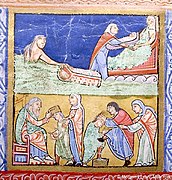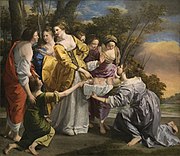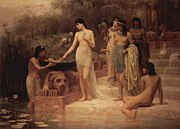Pharaoh's daughter (Exodus)
| Pharaoh's daughter | |
|---|---|
Egyptian |
The Pharaoh's daughter (
Her name
The Book of Exodus (Exodus 2:5) does not give a name to Pharaoh's daughter, or to her father; she is referred to in Hebrew as simply the Bat-Paroh[1] (Hebrew: בת־פרעה), a Hebrew phrase that literally translates to "daughter of Pharaoh." The Book of Jubilees (Jubilees 47:5) and Josephus both name her as Thermouthis (Greek: Θερμουθις), also transliterated as Tharmuth and Thermutis, the Greek name of Renenutet, the Egyptian snake deity.[2][3][4][5]
Meanwhile, some within Jewish tradition have tried to identify her with a "daughter of Pharaoh" in
In Christianity, she is also named as Merris or Merrhoe.[citation needed]
In Judaism
Now the daughter of Pharaoh came down to bathe at the river, and her maidens walked beside the river; she saw the basket among the reeds and sent her maid to fetch it. When she opened it she saw the child; and lo, the babe was crying. She took pity on him and said, "This is one of the Hebrews' children." Then his sister said to Pharaoh's daughter, "Shall I go and call you a nurse from the Hebrew women to nurse the child for you?" And Pharaoh's daughter said to her, "Go." So the girl went and called the child's mother. And Pharaoh's daughter said to her, "Take this child away, and nurse him for me, and I will give you your wages." So the woman took the child and nursed him. And the child grew, and she brought him to Pharaoh's daughter, and he became her son; and she named him Moses, for she said, "Because I drew him out of the water."
— RSV, Exodus 2:5–10
In the Jewish narrative, Pharaoh's daughter first appears in the Book of Exodus, in Exodus 2:5–10. The passage describes her discovery of the Hebrew child, Moses, in the rushes of the Nile River and her willful defiance of her father's orders that all male Hebrew children be drowned in the "Yeor" (Hebrew: יְאוֹר) (Nile), instead taking the child, whom she knows to be a Hebrew, and raising him as her own son. The Talmud and the Midrash Vayosha provide some additional backstory to the event, saying that she had visited the Nile that morning not to bathe for the purpose of hygiene but for ritual purification, treating the river as if it were a mikveh, as she had grown tired of people's idolatrous ways, and that she first sought to nurse Moses herself but he would not take her milk and so, she called for a Hebrew wet nurse, who so happened to be Moses' biological mother, Jochebed.[1][2][3][4]
Rabbinic literature tells a significantly different take on the events that day, portraying Pharaoh's daughter as having suffered from a skin disease[5] (possibly leprosy[11]), the pain of which only the cold waters of the Nile could relieve, and that these lesions healed when she found Moses. It also describes an encounter with the archangel Gabriel, who kills two of her handmaidens for trying to dissuade her from rescuing Moses.[5] After Moses is weaned, Pharaoh's daughter gives him his name, Moshé (Hebrew: מֹשֶה) purportedly taken from the word māšāh (Hebrew: מָשָׁה, lit. 'to draw from water'), because she drew him from the water, but some modern scholars disagree with the Biblical etymology of the name, believing it to have been based on the Egyptian root m-s, meaning "son" or "born of," a popular element in Egyptian names (e. g. Ramesses. Thutmose) used in conjunction with a namesake deity.[12][13]
According to Jewish tradition, in her later years Pharaoh's daughter devotes herself to Moses, and to Yahweh; she celebrates the first
In Islam

Pharaoh's daughter name is not mentioned in the Quran. But was mentioned in other sources such as the Hadith.
In the Hadith traced by Ibn ‘Abbas, he said: The Messenger of Allah ( Mohammed), peace and blessings be upon him, said: “On the night I was taken on the Isra (Night Journey), a pleasant scent came to me. I said: ‘O Gabriel, what is this pleasant scent?’ He replied: ‘This is the scent of the hairdresser, the daughter of Pharaoh, and her children.’ He continued, ‘What is her story?’ He said: ‘While she was combing Pharaoh’s daughter’s hair one day, the comb fell from her hand, and she said: “In the name of Allah.” Pharaoh’s daughter said: “My father?” She replied: “No, but my Lord and your father’s Lord is Allah.” She said: “Shall I inform him of this?” She replied: “Yes.” So, she informed him, and he called her and said: “O so-and-so, do you have a lord other than me?” She said: “Yes, my Lord and your Lord is Allah.” He then ordered a cow made of brass to be heated up, and then commanded that she and her children be thrown into it. She said to him, ‘I have one request to you,’ he said, ‘What is your need?’ She said: ‘I would like you to gather my bones and the bones of my children in one cloth and bury us.’ He replied, ‘That is your right upon us.’ He ordered her children to be thrown in front of her one by one until it was the turn of a suckling child she had. It seemed she hesitated because of him, he said: ‘O mother, plunge in, for the punishment of this world is lesser than the punishment of the Hereafter.’ So, she plunged in.”
This narration is found in Imam Ahmad’s “Musnad” (1/309), Al-Tabarani (12280).
In the Quran, Pharaoh's wife does not draw Moses from river Nile, her servants do, and Pharaoh, having learned of the boy's existence, seeks to kill him but she intervenes and Pharaoh changes his mind, allowing the boy to live. Mirroring the Judeo-Christian story,
Art and culture
Pharaoh's daughter is often included in Exodus-related art and fiction. Several artworks portray the finding of Moses.
In George Gershwin's 1935 opera Porgy and Bess, the song It Ain't Necessarily So mentions Pharaoh's daughter finding baby Moses.[17]
The Moses Chronicles (2015-), a novel-trilogy by
Drama-films depicting her include The Ten Commandments (1956),[19] the animated musical The Prince of Egypt (1998)[20] and Exodus: Gods and Kings (2014).[21] TV-dramas include Moses (1995).[22]
Gallery
-
Place where the pharaoh's daughter saved Moses from the Nile river, 1698 sketch made by Dutch traveller Cornelis de Bruijn on his journey through Egypt. The local inhabitants pointed out this spot.
-
12th century
-
Moses Saved from the Waters (c. 1556), Bernaert de Rijckere
-
Moses Saved from the Waters (1633), Orazio Gentileschi
-
The Finding of Moses (17th century), Andrea Celesti
-
The Finding of Moses (1740), Giovanni Battista Tiepolo
-
The Finding of Moses (1862), Frederick Goodall
-
Moses Saved from the Waters (1894), Jacques Clement Wagrez
-
Pharaoh's Daughter Receives the Mother of Moses (c. 1900), James Tissot
-
Edwin Long, 1886
-
Bithiah finds the infant Moses in The Ten Commandments, 1956
See also
- Entering heaven alive
- Moses in rabbinic literature
- List of names for the Biblical nameless
References
- ^ a b c "The Story of Batyah (Bithiah) – A Transformed Identity". www.chabad.org. Retrieved 2019-09-04.
- ^ JSTOR 40753100.
- ^ a b Josephus, Antiquities of the Jews 9,5
- ^ a b "Thermuthis – History's Women". Retrieved 2019-09-11.
- ^ a b c "Renenutet | Ancient Egypt Online". Retrieved 2019-09-11.
- ^ a b Scolnic, Benjamin Edidin. 2005. If the Egyptians Drowned in the Red Sea where are Pharaoh's Chariots?: Exploring the Historical Dimension of the Bible. University Press of America. p. 82.
- ^ "Daughter of Pharaoh: Midrash and Aggadah | Jewish Women's Archive". jwa.org. Retrieved 2019-09-04.
- ^ "BITHIAH". Jewish Encyclopedia. Retrieved 2019-09-05.
- ^ "Jehudijah Definition and Meaning – Bible Dictionary". Bible Study Tools. Retrieved 2019-09-11.
- ^ Kadari, Tamar. (1999) The Daughter of Pharaoh Is Bithiah. Jewish Women's Archive
- ^ Kadari, Tamar. "Daughter of Pharaoh: Midrash and Aggadah". The Encyclopedia of Jewish Women. Retrieved 2021-05-09.
- ^ "Was Moses' Name Egyptian?". www.bibleodyssey.org. Retrieved 2020-04-01.
- ^ "Strong's Hebrew: 4871. מָשָׁה (mashah) – to draw". biblehub.com. Retrieved 2019-09-11.
- ^ Segal, Rabbi Arthur (2010-08-11). "RABBI ARTHUR SEGAL: JEWISH RENEWAL: Jabez the Yahudahite". Rabbi Arthur Segal. Retrieved 2019-10-10.
- ISBN 978-1597842686.
- ^ Commentary on Hexameron MPG 18.785
- ISBN 9780195070071.
- ^ "Book review: 'Bondage' is an engaging first book in Moses Chronicles series". Deseret News. Aug 1, 2015. Retrieved 7 September 2019.
- ISBN 978-1-4617-3481-9.
- ISBN 978-0-415-67720-2.
- ^ Macnab, Geoffrey (1 December 2014). "Exodus: Gods And Kings - film review: Blood and big sets fail to make". The Independent. Retrieved 27 May 2022.
- ISBN 978-1-57506-127-6.
Bibliography
- Encyclopaedia Judaica, 1972, Keter Publishing House, Jerusalem, Israel.
- Jewish Encyclopedia.com
- Bithiah. (n.d.). Hitchcock's Bible Names Dictionary. Retrieved January 28, 2008, from Dictionary.com website: [1]











